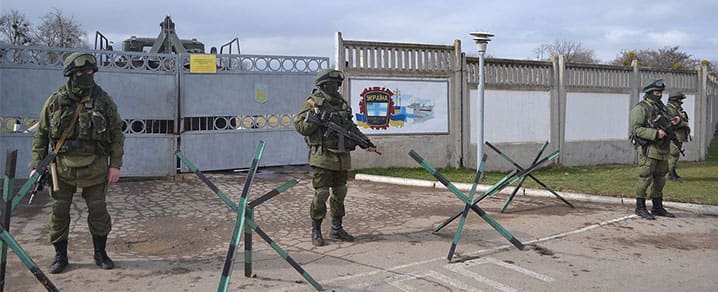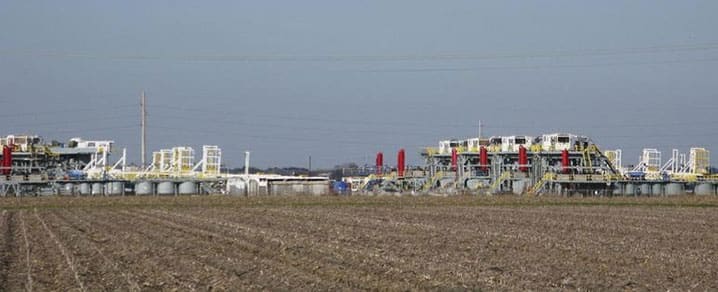2014 will be remembered as the year in which Russia’s illegal annexation of Crimea and the advances of the so-called “Islamic State” were facing NATO, for the first time in its history, with major security challenges both to its East and South. But that same year also marked the beginning of yet another development that will seriously affect the security situation in NATO’s neighbourhood: the decline of the global oil price. Should this low oil price affect the stability of oil-producing countries, NATO may end up with a perfect storm right on its doorstep.
The causes of the oil price collapse
Over the past two years the two major oil price indices – Brent and WTI (West Texas Intermediate) – went from an average $99 per barrel in 2014 to $53 in 2015, and to $28 in early 2016.
This steep drop was the result of several factors: the flat oil consumption in countries of the Organisation for Economic Cooperation and Development; the slower-than-usual increase in China’s oil demand due to its cooling economy; the massive increase in the United States’ unconventional oil and gas production, which reduced US imports and made more oil available on the global market; Saudi Arabia’s decision to retain its record high production levels in order to defend its market share; and the lack of consensus within the Organization of the Petroleum Exporting Countries (OPEC).
Saudi Arabia’s decision to retain its output levels may also have been motivated by additional considerations: to drive US unconventional oil and gas production out of business and to make Iran’s post-sanctions re-entry into the market more difficult.
However, due to technological advances, the US “fracking” industry turned out to be much more resilient than expected, allowing many US producers to innovate, enhance their production cost efficiency and stay in business even as the oil price went down. In fact, even if the price were to increase again, at least some producers with outdated oil sectors, such as Russia, Iran, and Venezuela, would still become less and less competitive – not least because a price increase would inevitably bring more “unconventionals” back into the market.
Prospects for a price rise
That the oil price will increase at least slightly is almost a foregone conclusion, as some producers are likely to finally curtail their production. A higher oil price will also make investments in the exploration of new oil and gas fields viable again – an important factor to avoid future scarcities and related price spikes.
But, for quite some time, the price is not likely to reach the $100 or more that characterised the past decade. This means that the economies of Russia and many oil-producing countries in the Middle East, North Africa and Latin America might be forced to produce below their economic break-even point, i.e. they will suffer financial losses. Not surprisingly Algeria, Angola, Ecuador, Nigeria and Venezuela and other poorer states with high populations have been trying, albeit unsuccessfully, to persuade OPEC to cut production in order to prop up prices.
Consequences
For states that used to “buy off” their populations through generous subsidies, a continuing global oil glut could translate into political unrest
The security dimensions of such a situation are obvious: for many oil-producing countries, a drop in the oil price below a certain level threatens to unravel the “social contract” between the regimes and their populations. For states that used to “buy off” their populations through generous subsidies, a continuing global oil glut could translate into political unrest.
Some analysts argue that the low oil price will help international stability, as it would force petro-states to focus on their domestic woes, allowing them fewer opportunities for pursuing assertive foreign policy agendas.
While this may be true for some countries, it is clearly not the case for others. The arch-rivals Iran and Saudi Arabia, for example, show no signs of ending their geopolitical competition due to domestic economic considerations. If anything, this competition is taking on an increasingly military dimension.
Nor does Russia’s foreign policy behaviour follow economic rationality: as Russia is heading for a recession while still spending more on its military modernisation, one cannot discount the risk that the leadership will seek to divert attention by engaging in foreign policy adventurism.
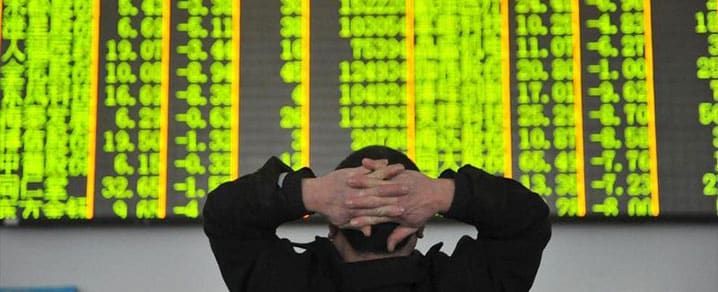
An investor looks at an electronic screen at a brokerage house in Hangzhou, Zhejiang province, January 26, 2016. Chinese shares had plunged more than 6 percent to 14-month lows after oil prices dropped again, reviving concerns about global growth. © REUTERS
New alliances?
This leads to another security dimension of the low oil price: potential geopolitical shifts caused by new alliances.
One such emerging alliance is that between Russia and Iran. It is obvious that Russia will suffer once Iran’s tremendous oil and gas reserves hit the market and further drive down the oil price. Still, Moscow has cooperated within the “P5+1 process” (the negotiations with Iran on its nuclear programme conducted by the UN Security Council's five permanent members, China, France, Russia, the United Kingdom and the United States – plus Germany) towards lifting the sanctions on Iran. It has also been doing business with Iran on a wide range of issues, from civilian nuclear power to arms sales.
The strategy of Russia vis-à-vis Iran appears to be to embrace rather than to compete with Tehran. By investing and exerting influence in Iran’s energy sector, Moscow may seek to ensure that Iran’s energy riches will not be exported in such a way as to directly compete with Russia. This strategy, which Moscow is also employing vis-à-vis some of its Central Asian neighbours, aims primarily at preventing these countries from independently exporting gas to Europe, which will remain Russia’s primary market for the foreseeable future.
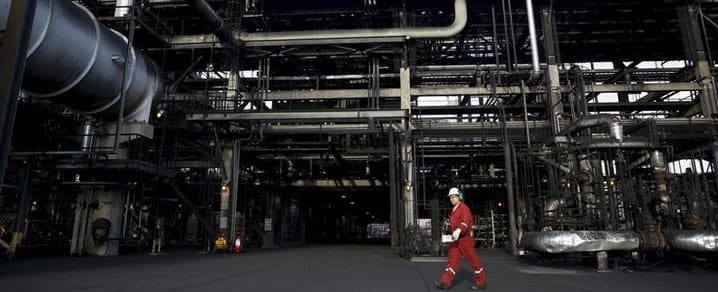
An oilfield worker walks next to pipelines at an industrial complex in the state of Anzoategui, Venezuela. In April 2015, Venezuela launched talks on a novel plan to blend the country's heavy crude with light oil from other OPEC allies, seeking to create a new variety that can compete against swelling US and Canadian supplies. The proposal, which would expand on a pilot scheme involving Algerian oil last year, envisions supplying refineries built for medium-grade crudes rather than the light oil that has become plentiful as a result of the North American shale boom. © REUTERS
Another alliance could emerge between China and Iran. Already now China is Iran’s largest trading partner, including in energy. For China, Iran could become an alternative to its growing energy dependency on Saudi Arabia. For Iran, in turn, China is a growing energy customer and potential investor. Tehran may also see Beijing as an “honest broker” in its difficult relationship with Saudi Arabia. Closer Sino-Iranian ties could be positive if China works for overall political stability and not just to advance its economic interests.
Implications for NATO
All NATO Allies are part of the coalition against the Islamic State of Iraq and the Levant (ISIL) in the Middle East. NATO is also seeking to enhance the stability and resilience of countries in the region by offering support for defence capacity building. This means that Allies are now engaged in a region where any political turmoil caused by a low oil price could affect them directly.
On the positive side, the low oil price has already dealt a heavy blow to ISIL’s finances even before the coalition’s air strikes against ISIL-operated refineries and fuel convoys deprived the terrorist group of an ever greater part of their revenues.

A row of Guided Bomb Unit 32s lie on a munitions assembly conveyer at Langley Air Force Base, Virginia, ready to be deployed to the US-led fight against Islamic State. © REUTERS
However, Iran and Saudi Arabia remain locked in a geopolitical, economic and religious rivalry, and both countries will need to produce oil at high levels to defend their market share and maintain revenues in order to satisfy their domestic constituencies. Iraq suffers from the onslaught by ISIL, domestic tensions, and the low oil price (as does Libya). Russia’s entry into the Syrian civil war has complicated the picture even more.
NATO will therefore have to deal with several actors in the region whose geopolitical objectives are not only at odds with one another, but whose political agendas might also be increasingly determined by the need to cope with economic decline and domestic unrest – a development that would make them even less predictable.
Moreover, instability brought about by “cheap oil” may result in an even heavier burden for a country like Jordan, which is already confronted with a massive refugee challenge. This, in turn, would put even more pressure on NATO to demonstrate the effectiveness of its regional stabilisation efforts.
From a NATO perspective, however, Russia clearly remains the most important security variable. With oil and gas exports accounting for over half of its budget revenues, the country is at a crossroads: the ruble has suffered a serious devaluation, the Central Bank’s reserves are dwindling, and foreign investment has all but dried up.
How will Russia react?
In theory, economic self-interest should tilt Moscow towards a more conciliatory policy vis-à-vis the West, notably to get the sanctions lifted that were imposed after the Crimea annexation, and to slow down European attempts to become more energy-independent from Russia.
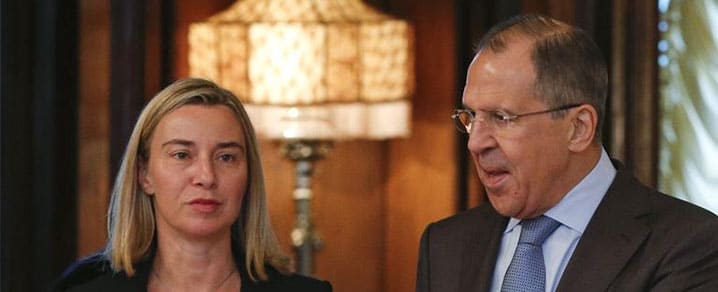
Russia's Foreign Minister Sergei Lavrov (R) shows the way to his Italian counterpart Federica Mogherini during a meeting in Moscow July 9, 2014. © REUTERS
However, while statements by Russian leaders indicate that they are aware of the precarious state of their economy, it is far from certain whether this will compel them to adopt a cooperative stance. For the time being, at least, Russia prefers to stick with its anti-Western course: high-flying military modernization plans, talk about an ambitious – yet unrealistic – “strategic partnership” with China, and nationalist rhetoric about the need to protect Russians abroad still dominate Russia’s foreign policy stance.
All this leaves one to wonder how Russia will react once the “cheap oil” recession really kicks in: will it acknowledge the challenge and face it head-on, by seeking to modernise and diversify its economy, or will it seek to distract its public by blaming the malign West for Russia’s ills? Moscow’s response will be a boon or a bane for European and, indeed, global stability.

